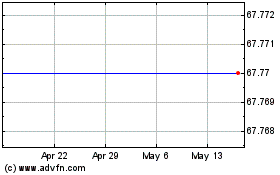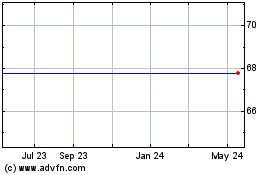ARM's $350 Million Deal Builds Future Beyond Smartphones
19 May 2016 - 1:10AM
Dow Jones News
LONDON—ARM Holdings PLC, the England-based tech firm that
designs most of the world's smartphone chips, said Wednesday that
it completed a $350 million acquisition of a computer-vision
company, in a bet that it can further ARM's goal of getting its
technology into new markets such as automobiles, robots and
everyday household items.
ARM acquired Apical Ltd., a U.K.-based company that develops
camera technology that lets electronic devices learn from their
environments. For example, its technology can help a security
camera distinguish between a human and cat.
Founded in 2002, Apical employs 100 people. The deal closed on
Tuesday.
ARM doesn't manufacture chips itself but designs the blueprint
of the microprocessors found in more than 95% of the world's
smartphones. The company charges smartphone makers such as Apple
Inc. and Samsung Electronics Co. an upfront licensing fee and
royalties on the volume of smartphones shipped.
As the growth in global smartphone shipments slows—ARM expects
an annual increase of 6% to 7% for the next five years—the company
has diversified. It designs the No. 1 smartphone graphics chip and
has steadily increased its share in the networking market,
designing chips for base stations and Wi-Fi routers, for example.
ARM is also in the early stages of designing chips for giant
computer servers, in a challenge to industry leader Intel Corp.
ARM sees one of its biggest opportunities in what the tech
industry refers to as the " Internet of Things," which involves
connecting to the Internet everyday items such as automobiles and
even household items such as lightbulbs.
All these objects will require chips, some of them very tiny,
that can process information and send the data online. ARM wants to
design the blueprint of these chips and, just as it does with its
smartphone business, charge an upfront licensing fee and earn
royalties every time someone purchases an item with an ARM-designed
chip.
That is how Apical can help, said Mike Muller, ARM's chief
technology officer. Apical has a similar business model to ARM: It
doesn't manufacture anything itself but designs the blueprint for
hardware that helps devices with displays or cameras be more
efficient. Now ARM can use Apical's expertise to help it design
better microprocessors and chips, and ARM can now also sell
Apical's current designs alongside ARM's offerings.
"The acquisition makes sense strategically," said Jefferies
analyst Robert Lamb. He said in the short term, ARM's smartphone
business can benefit from Apical, which designs a tiny piece of
hardware that helps displays adapt to changes in ambient light in
an energy-efficient way. And in the long term, Apical's
computer-vision technology can help ARM get its technology into
Internet of Things devices with displays or cameras.
Imagine a home-security camera connected to the Internet, Mr.
Muller said. It can automatically transmit live video to the
homeowner whenever it detects motion, but that would take up a lot
of power and bandwidth. Mr. Muller said with both Apical's software
and hardware, which is a tiny block of silicon inserted into an
ARM-designed microprocessor, the camera can learn to ignore pets
and transmit video only when it detects a human.
Based in Cambridge, England, ARM is regarded as one of the
U.K.'s top tech firms. Employing about 4,000 workers world-wide, it
reported revenue of $1.5 billion for 2015, up 15% from 2014.
Write to Stu Woo at Stu.Woo@wsj.com
(END) Dow Jones Newswires
May 18, 2016 10:55 ET (14:55 GMT)
Copyright (c) 2016 Dow Jones & Company, Inc.
Arm Holdings Plc ADS Each Representing 3 Ordinary Shares (MM) (NASDAQ:ARMH)
Historical Stock Chart
From Jan 2025 to Feb 2025

Arm Holdings Plc ADS Each Representing 3 Ordinary Shares (MM) (NASDAQ:ARMH)
Historical Stock Chart
From Feb 2024 to Feb 2025
